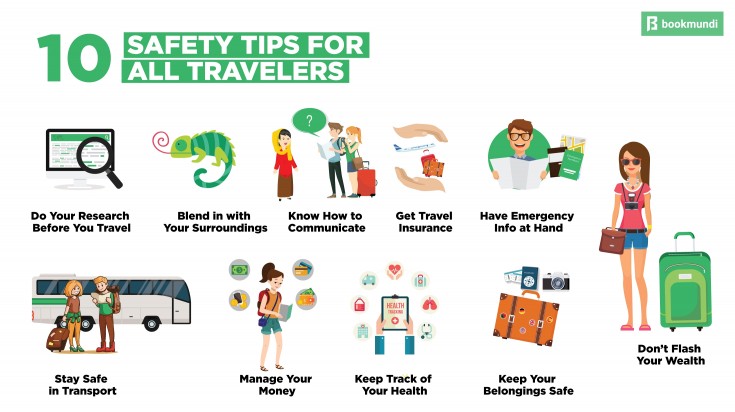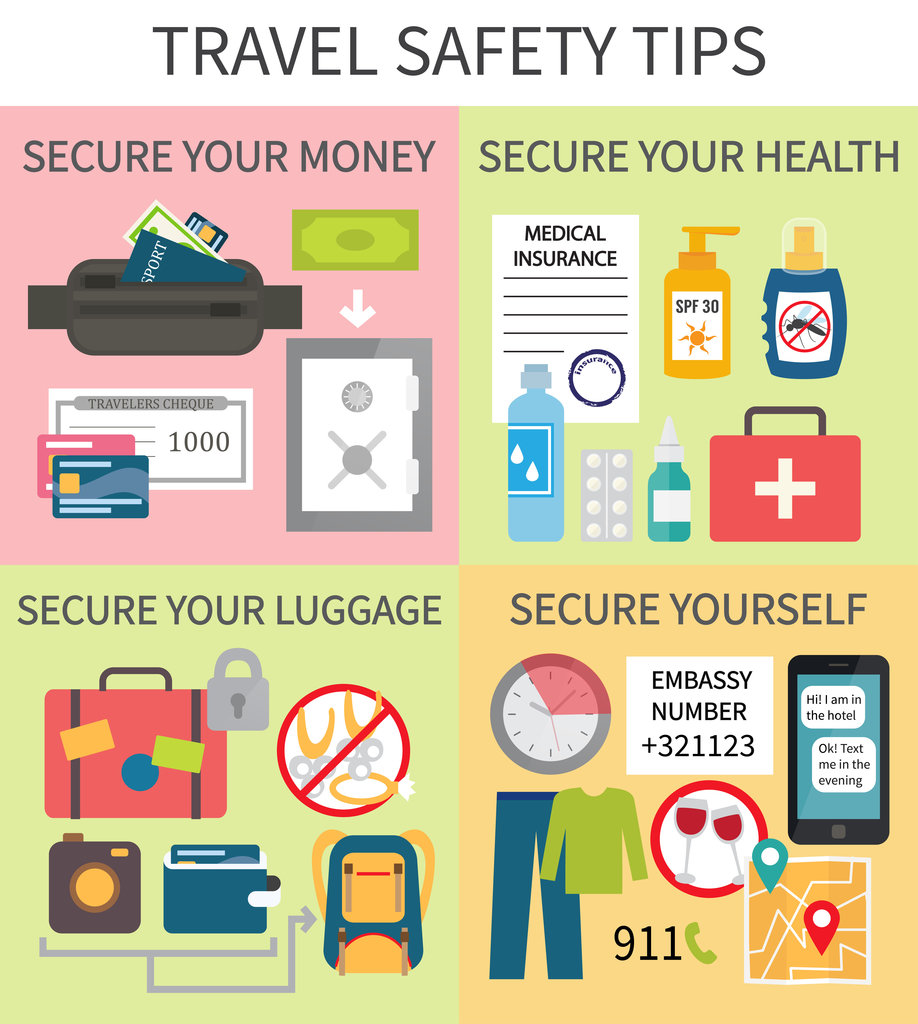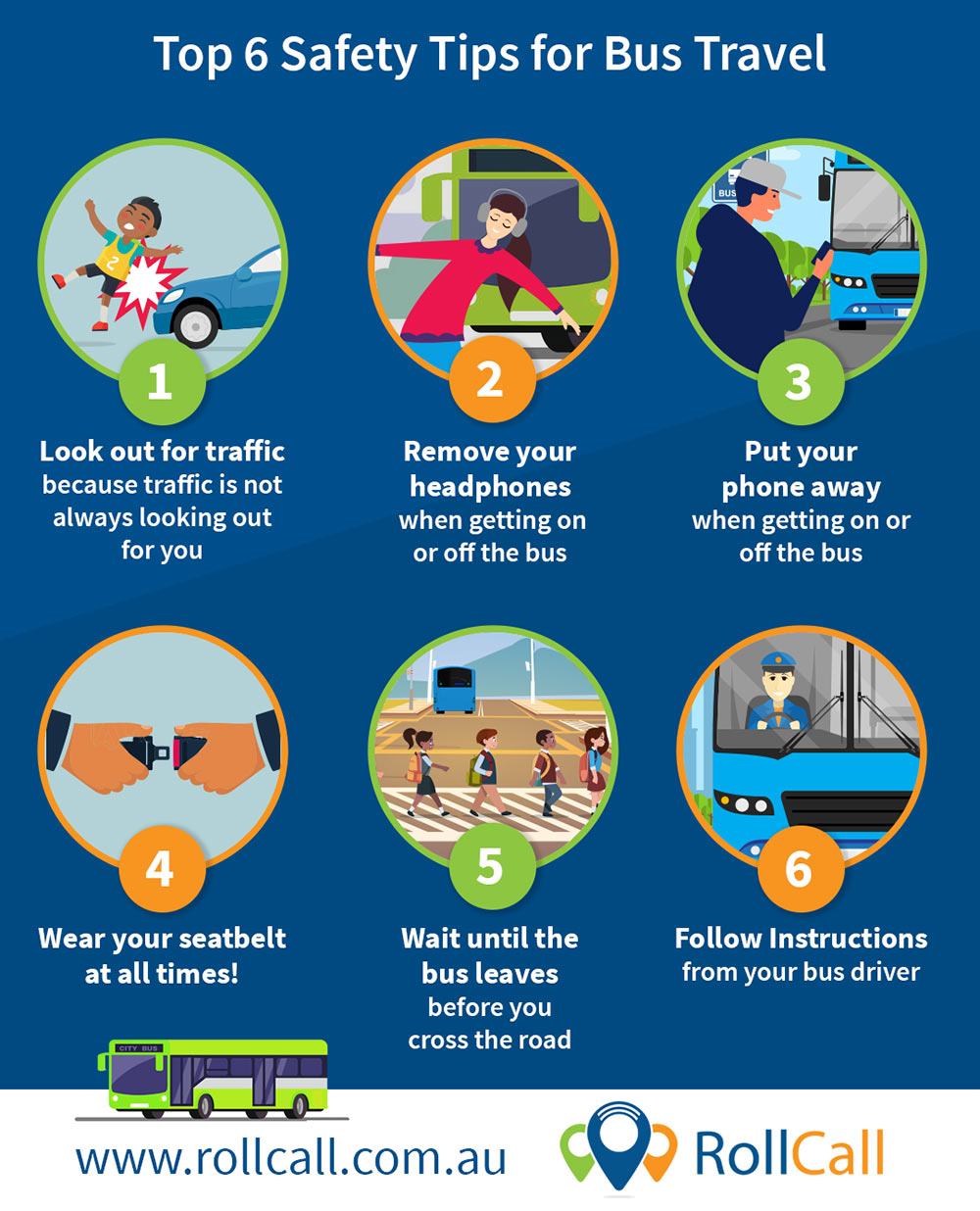Travel Safety Tips: Your Ultimate Guide to Staying Safe While Exploring the World
Traveling is an exciting experience, but it’s essential to stay safe while exploring new places. Whether you’re a seasoned traveler or just beginning to venture into the world, knowing the best safety practices can make all the difference. In this guide, we’ll cover the top travel safety tips to help you enjoy your trip without unnecessary stress or risk.

1. Plan Ahead and Stay Informed
Before embarking on any journey, proper planning is essential to ensure a safe trip. Research your destination thoroughly, including its safety conditions, travel advisories, and local customs. This will help you avoid risky areas and understand what to expect.
Key Safety Research Areas:
-
Health & Safety: Check for any health risks like diseases or vaccination requirements.
-
Weather Conditions: Understand the local climate to pack appropriately.
-
Political Stability: Make sure the region you’re traveling to is politically stable.
Stay informed about any local developments that may affect your trip, especially in volatile regions. Websites like the U.S. Department of State or your country’s travel advisory portal provide valuable information for international travelers.
2. Pack Light and Smart
When preparing for a trip, packing light not only makes your journey more comfortable but also reduces the risk of losing your belongings. Use a small, secure backpack or a crossbody bag to keep your essentials on you at all times.
Packing Tips:
-
Limit valuables: Leave expensive jewelry and unnecessary electronics at home.
-
Important documents: Always carry a copy of your passport, travel insurance, and emergency contacts in case of loss or theft.
-
Money safety: Use a money belt or neck pouch to store cash and cards securely.
By keeping your items to a minimum and well-secured, you’ll reduce the chances of losing important possessions.
3. Be Aware of Your Surroundings
Staying alert and aware of your environment is one of the best travel safety tips. Whether you’re walking through a busy city or exploring a remote area, maintaining awareness can help you avoid dangerous situations.
Ways to Stay Aware:
-
Stay sober: Avoid excessive alcohol consumption, which can impair your judgment.
-
Watch for scams: Be cautious of common travel scams, such as overcharging for services or fake tour guides.
-
Trust your instincts: If something doesn’t feel right, remove yourself from the situation.
Use Technology Wisely:
-
Offline maps: Use Google Maps or other offline maps to navigate unfamiliar areas.
-
Emergency apps: Download safety apps like TripWhistle or bSafe to easily contact emergency services.
4. Secure Your Accommodations
Choosing safe and reliable accommodations is essential for your peace of mind. Book your stay through trusted websites like Booking.com or Airbnb, and always check guest reviews before confirming a reservation.
Accommodation Safety Tips:
-
Location matters: Choose accommodations in well-populated, well-lit areas.
-
Security features: Ensure the place has proper security measures like a 24-hour reception or a safe for your valuables.
-
Emergency exits: Familiarize yourself with the nearest exit routes in case of emergencies.
Make sure you have backup options in case something goes wrong with your original accommodation.

5. Keep Emergency Information Handy
Having emergency contacts readily available can be a lifesaver when traveling. These contacts include local authorities, your embassy, and important phone numbers.
What to Carry:
-
Local emergency numbers: Keep the contact details of local police, hospitals, and the nearest embassy.
-
Travel insurance info: Have your insurance policy and emergency contact numbers saved digitally and physically.
-
Copies of key documents: Store photocopies of important documents like your passport and visa in case of loss or theft.
Having a reliable source of information can make it easier to act quickly in an emergency situation.
6. Stay Safe on Public Transportation
Using public transportation is an efficient way to get around, but it can also present safety risks. Scams and theft are common issues, especially in tourist-heavy areas. By taking a few precautions, you can ensure a safer experience on buses, trains, or subways.
Public Transport Safety Tips:
-
Avoid crowded places: If possible, avoid traveling during rush hours when crowds increase the risk of pickpocketing.
-
Secure your belongings: Keep your bag in front of you and tightly fastened.
-
Use reliable services: Opt for official taxis or transportation services rather than unofficial ones.
Tips for Bus Travel:
-
Board with care: Be cautious when getting on and off buses, especially in unfamiliar areas.
-
Choose reputable companies: Stick with well-known travel agencies or bus services to ensure safer travel.

7. Be Cautious with Food and Water
Foodborne illnesses can quickly ruin a trip, so it’s important to take extra precautions when eating and drinking while traveling.
Food and Water Safety Tips:
-
Drink bottled water: Avoid drinking tap water, especially in countries where sanitation might be a concern.
-
Eat freshly cooked food: Ensure that any food you eat is freshly prepared and thoroughly cooked.
-
Wash your hands: Carry hand sanitizer or wet wipes to clean your hands before eating.
It’s also a good idea to avoid street food if you’re unsure of the hygiene practices in the area, though many travelers enjoy it without issues.
8. Use Travel Insurance
One of the most important steps in ensuring a safe trip is having travel insurance. Accidents, cancellations, or unexpected medical issues can happen, and travel insurance can provide peace of mind.
Benefits of Travel Insurance:
-
Medical coverage: Travel insurance covers medical emergencies abroad, including doctor visits and hospital stays.
-
Trip cancellations: If you need to cancel or delay your trip, travel insurance can help recover lost costs.
-
Lost baggage protection: Get compensation if your luggage is lost or delayed.
Make sure to compare different insurance plans and choose one that best suits your needs and destination.
Conclusion
Traveling is one of the most enriching experiences, but it’s important to take precautions to ensure your safety. By following these travel safety tips, from planning ahead and securing accommodations to staying aware of your surroundings, you can minimize risks and make the most of your travels. Always stay informed, prepared, and ready to adapt to new situations. Safe travels!
Frequently Asked Questions (FAQs)
1. What should I do if I lose my passport abroad?
If you lose your passport while traveling, report the loss to the local police and then contact your country’s embassy or consulate to get a replacement.
2. Is it safe to travel alone?
Traveling alone can be safe as long as you take proper precautions. Avoid risky areas, stay in well-populated places, and keep in touch with loved ones regularly.
3. How can I protect myself from travel scams?
Be cautious of overly aggressive vendors, unsolicited offers, or anyone asking for personal information. Stick to well-known services and always do thorough research before booking activities or tours.
4. Should I avoid using public Wi-Fi while traveling?
Yes, public Wi-Fi can be insecure, and it’s best to avoid accessing sensitive information while on it. Use a VPN or your mobile data when browsing or making transactions.
By following these travel safety tips, you’ll ensure your trip remains exciting, fun, and free of unnecessary stress.
